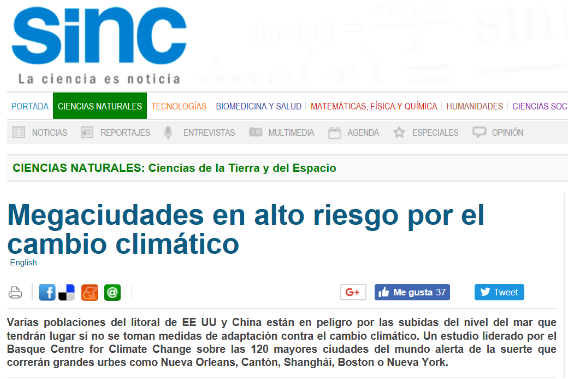October 9, 2009
Published by BC3Research at October 9, 2009
Categories
Jose Manuel ChamorroLuis Mª Abadie.Efficiency gains have put a limit on fuel consumption growth in the past. In addition to energy savings, these improvements have another basic impact, namely the avoiding of the greenhouse gas (GHG) emissions that go hand in hand with fossil fuel combustion. To the extent that there is a price for these emissions, curbing them has economic value for firms that operate in an emissions-constrained environment. This holds also where no such price exists currently but there is a chance that climate restrictions will be imposed in the future.
There is a broad consensus that energy efficiency can play a significant role in curbing GHG emissions while paying for itself. However, investments that at first glance seem worthwhile are frequently not undertaken. This situation can be traced back in part to the challenge of attracting sufficient interest from the investment community. Fortunately, though, energy-efficiency investments lend themselves to financial analysis. We analyse investments in efficiency (and savings in energy) from the viewpoint of a firm or individual that behaves rationally, i.e. in his/her best economic interest.
The investment or project is valued as a (real) option that is only exercised at the optimal time and is irreversible (the firm cannot disinvest should market conditions turn). The return on this investment is highly uncertain. Uncertainty emanates from energy prices and emission allowance prices, but regulatory uncertainty may top them all. We aim to determine the optimal time to invest or, in other words, to learn the conditions under which the investment should be made.
Our theoretical model comprises two stochastic processes for fuel (say, natural gas) price, and emission (say, carbon) allowance price, respectively. With regard to the carbon price, we consider a standard geometric Brownian motion (GBM) in two different scenarios: within a given commitment period (e.g., 2008-2012), and between two successive periods (i.e. the current one and the immediate post-Kyoto period), presumably separated by a change in climate regulation with an ensuing jump in carbon prices. As for the natural gas price, we assume a mean-reverting process in which the long-term equilibrium level grows deterministically over time. The key underlying parameters in these processes are estimated from actual market prices. We can then assess energy-efficiency investments in a fairly realistic setting. As a case study, we consider a potential investment in either of two different gas-fired power stations that differ in their efficiency levels. In particular, we derive the total return to an increase of a percentage point in thermal efficiency as a function of the plant's production factor or availability rate.
Do you like it?
February 19, 2010
Published by BC3Research at February 19, 2010
Categories
V Congreso de la Asociacion Española para la Economia EnergeticaLos investigadores del BC3 Luis María Abadie y Mikel González-Eguino participaron en el V Congreso de la Asociacion Española para la Economia Energetica ofreciendo la ponencia que llevaba como titulo: "Optimal investment in energy efficiency under uncertainty".
Do you like it?
March 19, 2018
Published by BC3Research Luis Mª Abadie at March 19, 2018
Categories
Varias poblaciones del litoral de EE UU y China están en peligro por las subidas del nivel del mar que tendrán lugar si no se toman medidas de adaptación contra el cambio climático. Un estudio liderado por el Basque Centre for Climate Change sobre las 120 mayores ciudades del mundo alerta de la suerte que correrán grandes urbes como Nueva Orleans, Cantón, Shanghái, Boston o Nueva York

